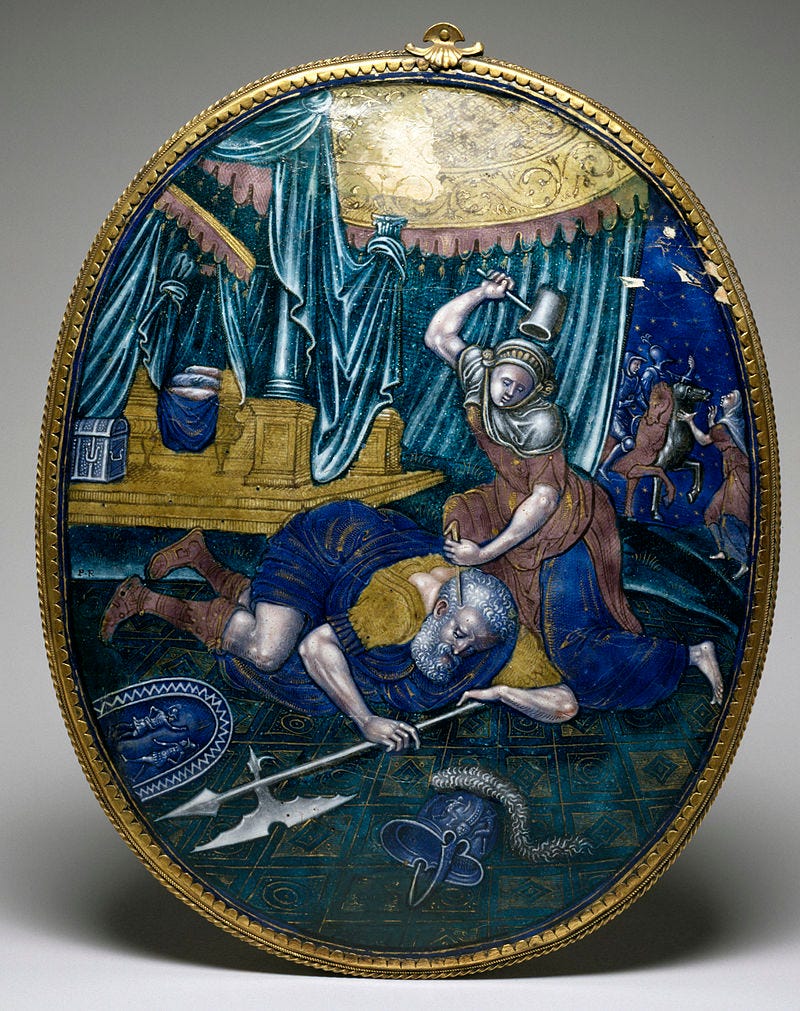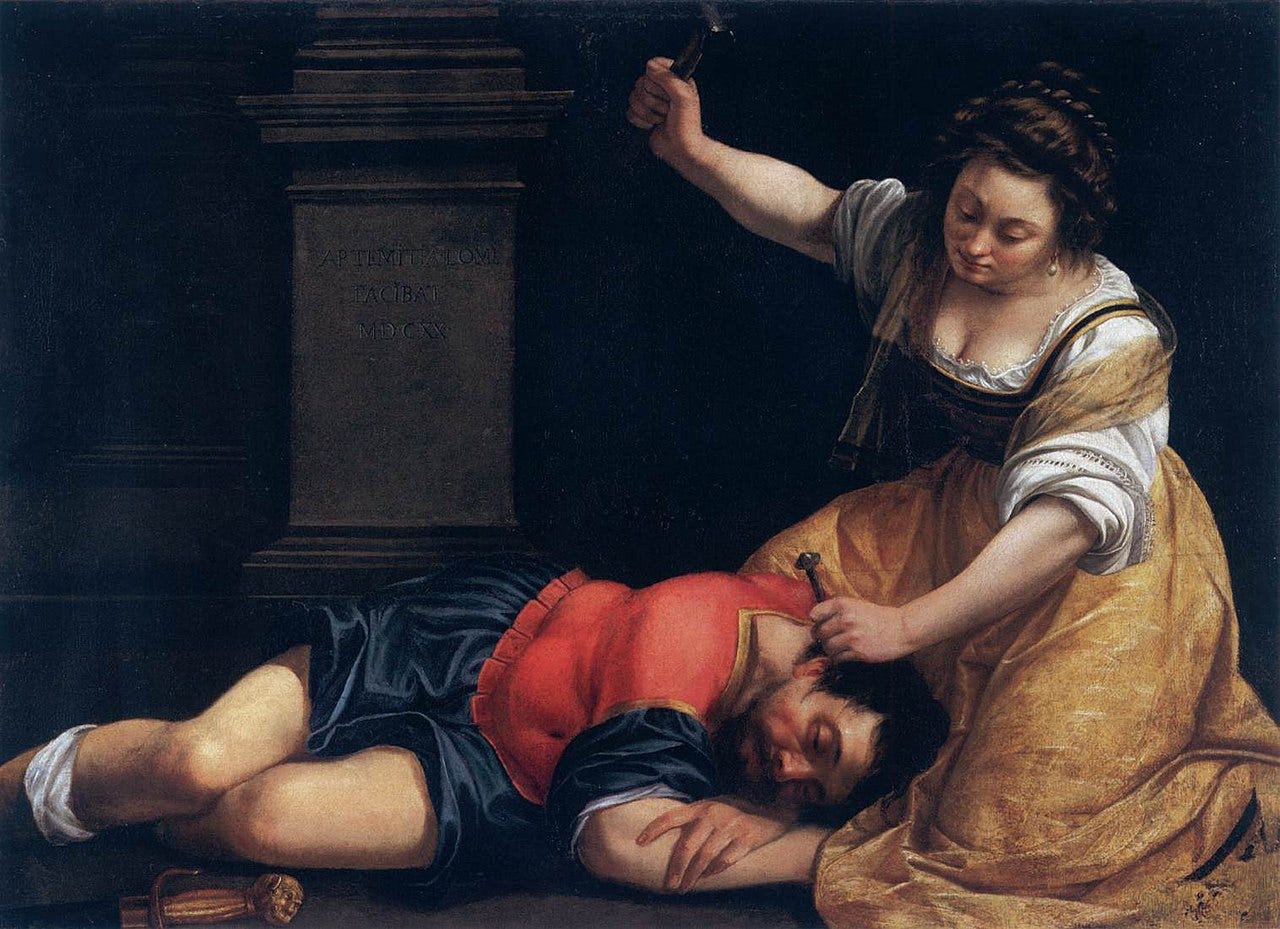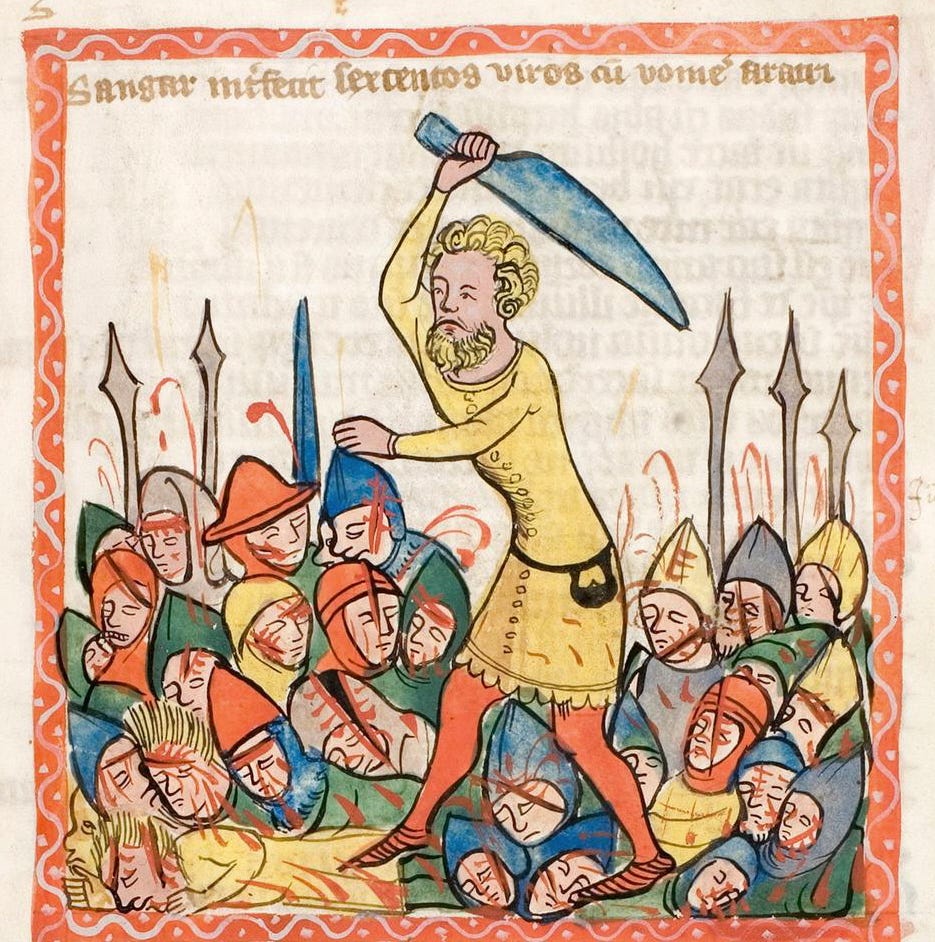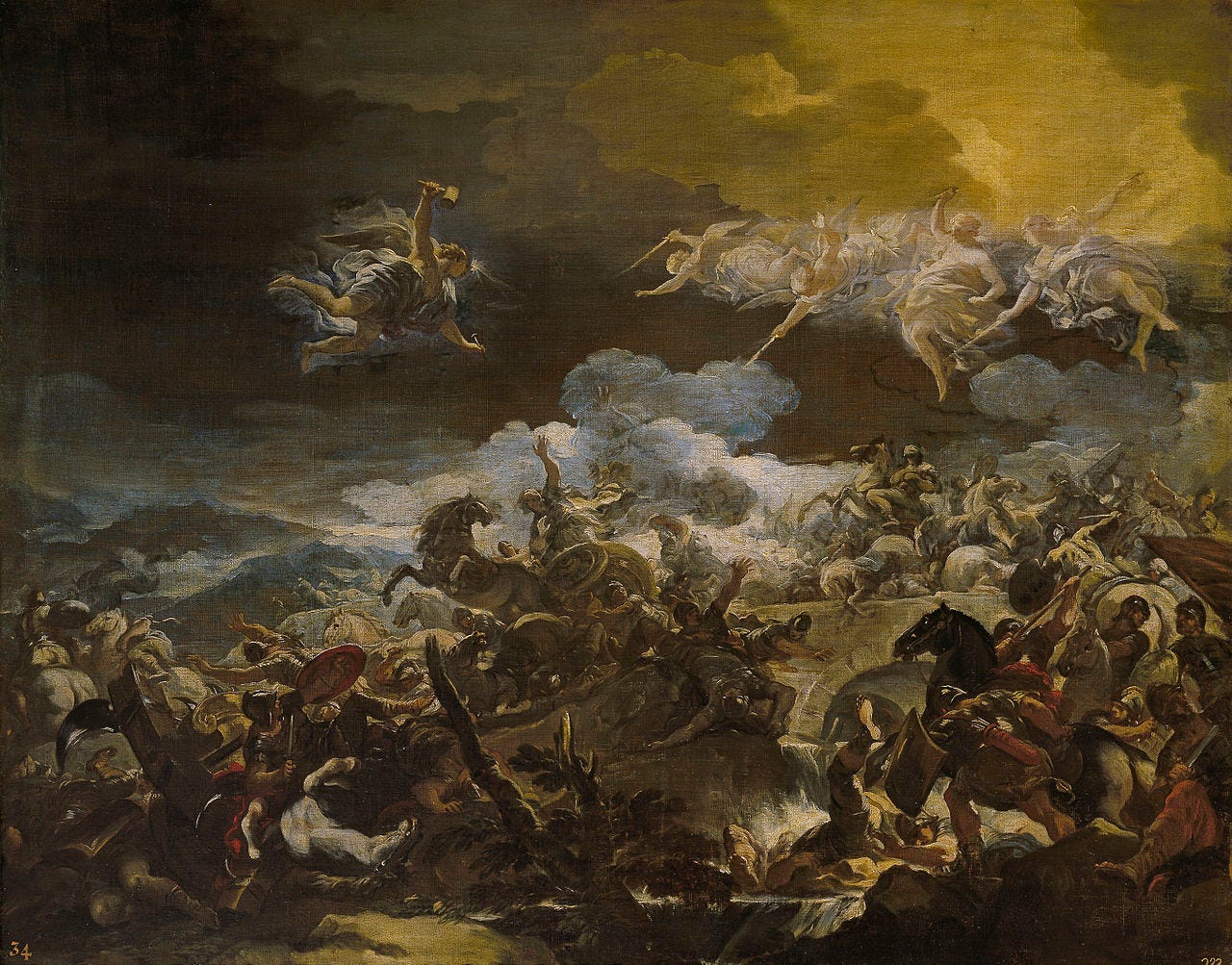
In our study of the weird parts of the Hebrew Bible, we are currently working through the ruthless, sexy, and casually violent Book of Judges. Previously you heard me kvetch about Yiftach, world-class idiot and president of the Bad Dad Club.
But this time we’re talking about Deborah, one of the few woman in a position of leadership in the Bible, her hapless sidekick Barak, and Yael, who turns out to be a real piece of work.
It’s a wild ride, and you’ll like it—even if you’re a little squeamish. As long as, you know, you’re not too squeamish.
And now to the hills of Ephraim, where we lay our scene.
Meet Barak, commander of the Israelite forces. A commander in these lawless times is supposed to be a bloodthirsty maniac, but not Barak. In fact, he’s a bit of a coward.
His military career has coincided with twenty years of regional dominance by King Hazor and his general, Sisera. Not that Sisera was some sort of tactical wizard or anything. He was handed a professional army and nine-hundred iron chariots, a.k.a. Jew Crushers. If you had 900 Jew Crushers you’d also be able to dominate a loose affiliation of shepherds. And so it has been twenty years of deeply humiliating peace and quiet in Israel.
When Barak was a young soldier, people told stories about Ehud. Ehud was the champion who took on Eglon, King of Moab, a fat monarch who demanded (and received) heavy tribute. When Ehud, a left-handed menace, rose to prominence, Israel elected to send the tribute along with him, figuring he’d do something absolutely insane with the opportunity.
Ehud arrived and delivered the payment in Eglon’s court. Then, leaning in close to Eglon, he whispered: I have a secret, just for you.
Eglon, definitely intrigued by the promise of a bit of mano a mano time with the young Israelite, dismissed his court.
Now alone, Ehud said: I have a message for you, it’s from God. And his left arm disappeared into his cloak and emerged with the sword he’d spent the last four months sharpening. It slides easily into Eglon’s tremendous personage but gets caught in his fat. Retched intestinal filth pours out of the wound.
The smell fills the palace. The courtiers however—I promise this is how the story goes—presume it’s just Eglon taking his afternoon dump. They roll their eyes and say, dude, did I tell you I asked for a transfer to Phoenicia? Ehud climbs out a window, leaving Eglon’s body behind.
That’s the kind of psychopath the people need, Barak knows. But it’s not him.

On a furiously hot morning in the hills of Ephraim, Barak has been summoned to meet Deborah. Deborah is a prophet, the closest thing to a leader these feckless Israelites have. Each day she sits beneath a palm tree, answering questions and settling disputes. Things like, does God like barely offerings? What’s the punishment for stealing a goat? Are these stones too small for stoning?
This is Deborah’s job, and if she seems a bit bored at times…well, that’s why she has summoned Barak, who has finally showed up. She dismisses her court, and it is just the two of them beneath the palm.
Listen, Deborah says, as Barak settles into the shade. It’s time. You’ll need about ten thousand troops. Recruit them from Naftali and Zebulun. They know what’s good for them, you should have no trouble. March up Mount Tabor and wait for Sisera to approach. Draw him into the valley. Descend, attack, wound, maim, kill, kill, kill, kill. That’s the plan.
Barak stares down at his sandals.
Thus, Deborah pointedly adds, sayeth the Lord.
He kicks a stone. Barak searches for the right words but can’t find them—so he goes with the wrong ones.
I don’t think this is a good idea, he says. He is no doubt imagining what ten thousand smooshed Israelites look like when stacked up in a pile at the bottom of Mount Tabor.
Deborah grins. She is no doubt imagining Barak wearing a giant diaper with a great big bonnet on his bald head.
Barak regains his composure. I will not be responsible for this, he says. If you ask me to send these men to their deaths, I’ll do it, but only with you standing next to me. Otherwise, I cannot.
Deborah laughs.
No problem, big guy. But know this, Barak son of Avinoam of Kedesh—
…and suddenly Deborah’s eyes roll back and the wind freezes, birds stop mid-flap, existence around Barak turns to sludge. It feels as if time itself is oozing like honey out of Deborah—Deborah, whose open mouth has suddenly become the focal point around which the entire universe spins.
Or imagine it however you like, but that’s how I say a prophecy would feel.
She speaks: Barak will receive no spoils of victory. Sisera will fall, but will fall to the hands of a woman. She will receive glory, not you.
She dismisses him.
Later, while walking back over the hills of Ephraim, Barak figured he had a pretty good idea which woman was destined for glory.
Wrong again, buddy.
Deborah and Barak stand together atop Mount Tabor. In the valley is Sisera and his chariots, who have played nice so far. The Israelite troops are nervous, but they’re also excited to kill some guys. There’s good energy all around.
Whenever you’re ready, she says to Barak.
Barak nods and waits. He waits some more.
Deborah thwacks him in the shin with her staff.
God says go, dummy!, she says.
Barak takes a deep breath and gives the signal. The Israelite troops charge down the hill.
Sisera hears their roar before he sees their movement. Just another day in the office, he tells himself. Some restless locals letting off steam. If ignored too long, a conquered people grows unruly; one must trim the hedges until they return to their tidy, content lives.
And then Sisera sees the Israelites pouring down from Mount Tabor, and words and logic dissolve. Courage is a kind of decision, one that he is simply unable to make. He notices a panic enveloping him, and before long he is no longer in control.
In the confusion, his army is overwhelmed by the energetic Israelite force. It is a slaughter; the smushee has become the smusher, there are a lot of dead Canaanites and broken chariots at the bottom of that hill. Barak is relieved. Yay!!!!!
But, wait—Sisera is nowhere to be found. Where has he gone?
Deborah and Barak have no idea that he has slipped away, leaving his troops behind and seeking safety for himself.

Yael is a member of the Kenites, a Canaanite clan allied with Sisera.
She sees Sisera approaching her tent. Sisera is ragged and dirty. He is panting, talking about some monstrous Israelite force that is inhuman in its ferocity.
Come in, Yael says. Don’t be afraid. She smiles. LIKE A PSYCHOPATH.
Here’s the thing: some men are cowards and some women are not, and there is something despicable about a coward—in the eyes of the courageous, at least. Maybe what’s about to happen is as simple as that.
Sisera thanks Yael for her kindness, which he assures her will be neither forgotten nor unrewarded. He goes into her tent, she covers him with a blanket. He begs her not to let anyone else in. Hide me, he says.
Now you may be wondering, “covers him with a blanket”—is that a euphemism for something? Congrats! You are a rabbi. The rabbis definitely thought it was a euphemism for something. The Talmud says that Yael seduced Sisera seven times in quick succession, to bring him to the brink of exhaustion. Yael seems like a nice gal.
Can I have a drink of water, Sisera asks.
I’ll do you better, Yael responds, and gives him a jug full of delicious, heavy milk.
Soon after, Sisera falls deeply asleep.
Yael, humming to herself, grabs a hammer.
Yael pulls a stake out of her tent.
Yael delicately places the stake on Sisera’s temple, brings the hammer into the air, and then BAM. BAM. BAM. BAM. BAM. BAM. BAM. BAM. BAM. BAM. BAM. BAM. BAM. BAM.
BAM.
Yael crushes the bejeezus out of Sisera’s poor skull, and Sisera the Canaanite was no more.

When news reaches the Israelite camp of what Yael had done to the bones in Sisera’s head, and also to his brain, and his face, there is a huge celebration. As is traditional, Deborah and Barak mark the occasion with a song of victory.
The song thanks the Big Guy upstairs, heralds the work of Deborah and Barak and then turns to that “most blessed woman” Yael. The song goes like this:
Praise Yael! A real nutty lady.
Haha just kidding Yael, I hope we’re cool.
Is that her coming this way with her hammer?
Oh shit, everybody run!
And then, at the very end of the song, there is one last verse. Did Deborah or Barak add it? I suppose it doesn’t matter. It is for Sisera’s mother.
We see Sisera’s mother in her home, where she is growing increasingly anxious by her son’s absence:
The mother of Sisera looked out at a window, and cried through the lattice,
Why is his chariot so long in coming?
Why tarry the wheels of his chariots?
The mother’s friends try to reassure her. Sisera is bound to arrive. He’s merely divvying up the spoils of war, counting concubines, drinking the blood of his enemies, reveling in their defeat, and so on, and will surely return home very soon indeed.
Sisera’s mother says nothing in response, and as the song ends she is still staring out her window, waiting to embrace her son as he rides up in his iron chariot. Some men are cowards, some women are not, but as for who is who, it’s not always easy to tell.







This is a fantastic series. Informative and witty rolled into one. Look forward to many more.
A tale fit for the ages! I definitely prefer the torah when its praising women rather than painting them as harlots!